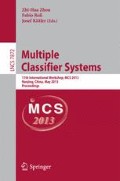Abstract
In this paper we examine the effect of applying ensemble learning to the performance of collaborative filtering methods. We present several systematic approaches for generating an ensemble of collaborative filtering models based on a single collaborative filtering algorithm (single-model or homogeneous ensemble). We present an adaptation of several popular ensemble techniques in machine learning for the collaborative filtering domain, including bagging, boosting, fusion and randomness injection. We evaluate the proposed approach on several types of collaborative filtering base models: k-NN, matrix factorization and a neighborhood matrix factorization model. Empirical evaluation shows a prediction improvement compared to all base CF algorithms. In particular, we show that the performance of an ensemble of simple (weak) CF models such as k-NN is competitive compared with a single strong CF model (such as matrix factorization) while requiring an order of magnitude less computational cost.
Access this chapter
Tax calculation will be finalised at checkout
Purchases are for personal use only
Preview
Unable to display preview. Download preview PDF.
References
Sarwar, B., Karypis, G., Konstan, J., Riedl, J.: Analysis of Recommendation Algorithms for E-Commerce. In: Proc. of the 2nd ACM Conference on E-commerce, pp. 158–167 (2000)
Sarwar, B., Karypis, G., Konstan, J., Riedl, J.: Item-based collaborative filtering recommendation algorithm. In: Proceedings of the 10th International Conference on World Wide Web, pp. 285–295 (2001)
Koren, Y.: Factorization Meets the Neighborhood: a Multifaceted Factor in the Neighbors: Scalable and Accurate Collaborative Filtering. In: Proc. 14th ACM Int. Conference on Knowledge Discovery and Data Mining (KDD 2008). ACM Press (2008)
Burke, R.: Hybrid recommender systems: Survey and Experiments. User Model. User-Adapt. Interact. 12(4), 331–370 (2002)
Takacs, Pilaszy, I., Nemeth, B., Tikk, D.: Scalable Collaborative Filtering Approaches for Large Recommender Systems. JMLR 10, 623–656 (2009)
Bell, R., Koren, Y.: Lessons from the Netflix Prize Challenge. SIGKDD Explorations 9 (2007)
Bell, R., Koren, Y.: Scalable Collaborative Filtering with Jointly Derived Neighborhood Interpolation Weights. In: IEEE International Conference on Data Mining (ICDM 2007), pp. 43–52 (2007)
Candillier, L., Meyer, F., Fessant, F.: Designing Specific Weighted Similarity Measures to Improve Collaborative Filtering Systems. In: IEEE International Conference on Data Mining (2008)
Su, X., Khoshgoftaar, T.M., Zhu, X., Greiner, R.: Imputation-boosted collaborative filtering using machine learning classifiers. In: Proceedings of the 2008 ACM Symposium on Applied Computing (2008)
Wu, M.: Collaborative Filtering via Ensembles of Matrix Factorizations. In: Proceedings of KDD Cup and Workshop (2007)
Lee, J.-S., Olafsson, S.: Two-way cooperative prediction for collaborative filtering recommendations. Expert Systems with Applications (2008)
Schclar, A., Meisels, A., Gershman, A., Rokach, L., Tsikinovsky, A.: Ensemble Methods for Improving the Performance of Neighborhood-based Collaborative Filtering. In: Proceedings of ACM RecSys 2009 (2009)
Freund, Y., Schapire, R.E.: Experiments with a New Boosting Algorithm. In: Machine Learning: Proceedings of the Thirteenth International Conference (1996)
Jahrer, M., Töscher, A., Legenstein, R.: Combining predictions for accurate recommender systems. In: Proc. 16th ACM SIGKDD, pp. 693–702 (2010)
Breiman, L.: Bagging Predictors. Machine Learning 24, 123–140 (1996)
Shrestha, D., Solomatine, D.: Experiments with AdaBoost.RT, an improved boosting scheme for regression. Neural Computation 18 (2006)
Cherkauer, K.J.: Human expert level performance on a scientific image analysis task by a system using combined artificial neural networks. In: Proc. AAAI 1996 Workshop on Integrating Multiple Learned Models for Improving and Scaling Machine Learning Algorithms, Portland, OR, pp. 15–21. AAAI Press, Menlo Park (1996)
Friedman, J.H.: Stochastic gradient boosting. Computational Statistics & Data Analysis 38(4), 367–378 (2002)
Author information
Authors and Affiliations
Editor information
Editors and Affiliations
Rights and permissions
Copyright information
© 2013 Springer-Verlag Berlin Heidelberg
About this paper
Cite this paper
Bar, A., Rokach, L., Shani, G., Shapira, B., Schclar, A. (2013). Improving Simple Collaborative Filtering Models Using Ensemble Methods. In: Zhou, ZH., Roli, F., Kittler, J. (eds) Multiple Classifier Systems. MCS 2013. Lecture Notes in Computer Science, vol 7872. Springer, Berlin, Heidelberg. https://doi.org/10.1007/978-3-642-38067-9_1
Download citation
DOI: https://doi.org/10.1007/978-3-642-38067-9_1
Publisher Name: Springer, Berlin, Heidelberg
Print ISBN: 978-3-642-38066-2
Online ISBN: 978-3-642-38067-9
eBook Packages: Computer ScienceComputer Science (R0)

